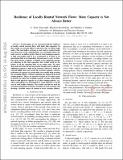| dc.contributor.author | Yazicioglu, Ahmet Yasin | |
| dc.contributor.author | Roozbehani, Mardavij | |
| dc.contributor.author | Dahleh, Munther A | |
| dc.date.accessioned | 2017-07-21T13:45:35Z | |
| dc.date.available | 2017-07-21T13:45:35Z | |
| dc.date.issued | 2016-12 | |
| dc.date.submitted | 2016-12 | |
| dc.identifier.isbn | 978-1-5090-1837-6 | |
| dc.identifier.uri | http://hdl.handle.net/1721.1/110796 | |
| dc.description.abstract | In this paper, we are concerned with the resilience of locally routed network flows with finite link capacities. In this setting, an external inflow is injected to the so-called origin nodes. The total inflow arriving at each node is routed locally such that none of the outgoing links are overloaded unless the node receives an inflow greater than its total outgoing capacity. A link irreversibly fails if it is overloaded or if there is no operational link in its immediate downstream to carry its flow. For such systems, resilience is defined as the minimum amount of reduction in the link capacities that would result in the failure of all the outgoing links of an origin node. We show that such networks do not necessarily become more resilient as additional capacity is built in the network. Moreover, when the external inflow does not exceed the network capacity, selective reductions of capacity at certain links can actually help averting the cascading failures, without requiring any change in the local routing policies. This is an attractive feature as it is often easier in practice to reduce the available capacity of some critical links than to add physical capacity or to alter routing policies, e.g., when such policies are determined by social behavior, as in the case of road traffic networks. The results can thus be used for real-time monitoring of distance-to-failure in such networks and devising a feasible course of actions to avert systemic failures. | en_US |
| dc.language.iso | en_US | |
| dc.publisher | Institute of Electrical and Electronics Engineers (IEEE) | en_US |
| dc.relation.isversionof | http://dx.doi.org/10.1109/CDC.2016.7798255 | en_US |
| dc.rights | Creative Commons Attribution-Noncommercial-Share Alike | en_US |
| dc.rights.uri | http://creativecommons.org/licenses/by-nc-sa/4.0/ | en_US |
| dc.source | arXiv | en_US |
| dc.title | Resilience of locally routed network flows: More capacity is not always better | en_US |
| dc.type | Article | en_US |
| dc.identifier.citation | Yazicioglu, A. Yasin, Mardavij Roozbehani, and Munther A. Dahleh. “Resilience of Locally Routed Network Flows: More Capacity Is Not Always Better.” 2016 IEEE 55th Conference on Decision and Control (CDC), Las Vegas, Nevada, USA, 12-14 December, 2016. Institute of Electrical and Electronics Engineers (IEEE), 2016 . | en_US |
| dc.contributor.department | Massachusetts Institute of Technology. Institute for Data, Systems, and Society | en_US |
| dc.contributor.department | Massachusetts Institute of Technology. Laboratory for Information and Decision Systems | en_US |
| dc.contributor.mitauthor | Yazicioglu, Ahmet Yasin | |
| dc.contributor.mitauthor | Roozbehani, Mardavij | |
| dc.contributor.mitauthor | Dahleh, Munther A | |
| dc.relation.journal | 2016 IEEE 55th Conference on Decision and Control (CDC) | en_US |
| dc.eprint.version | Original manuscript | en_US |
| dc.type.uri | http://purl.org/eprint/type/ConferencePaper | en_US |
| eprint.status | http://purl.org/eprint/status/NonPeerReviewed | en_US |
| dspace.orderedauthors | Yazicioglu, A. Yasin; Roozbehani, Mardavij; Dahleh, Munther A. | en_US |
| dspace.embargo.terms | N | en_US |
| dc.identifier.orcid | https://orcid.org/0000-0001-6957-6831 | |
| dc.identifier.orcid | https://orcid.org/0000-0002-1470-2148 | |
| mit.license | OPEN_ACCESS_POLICY | en_US |
